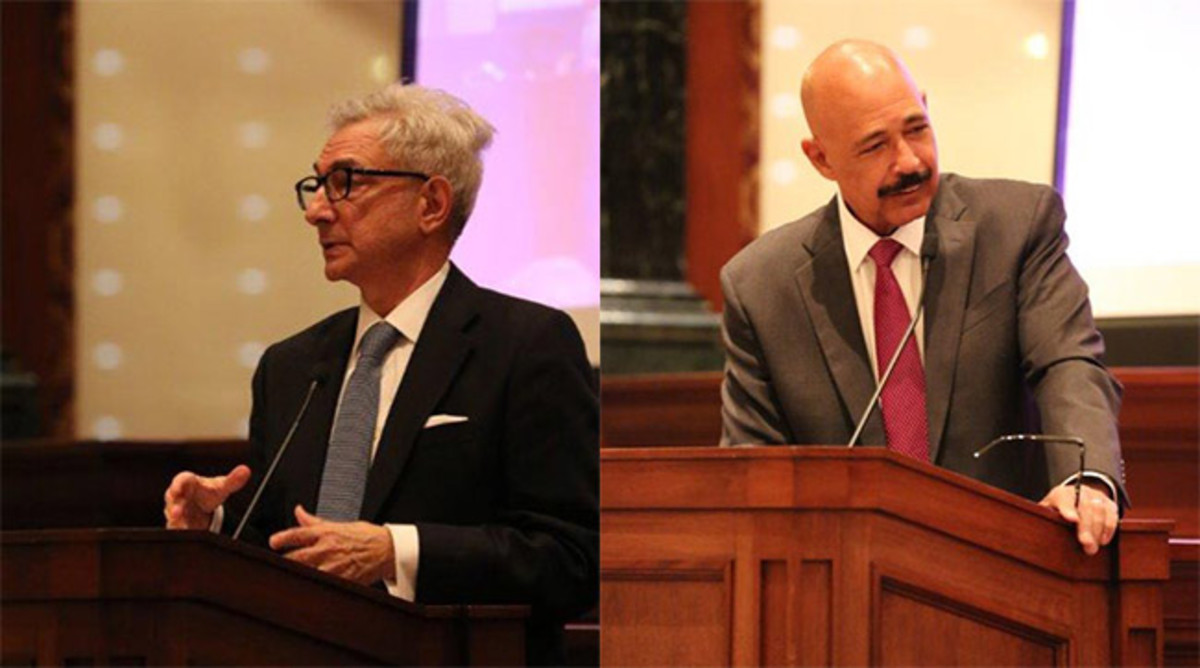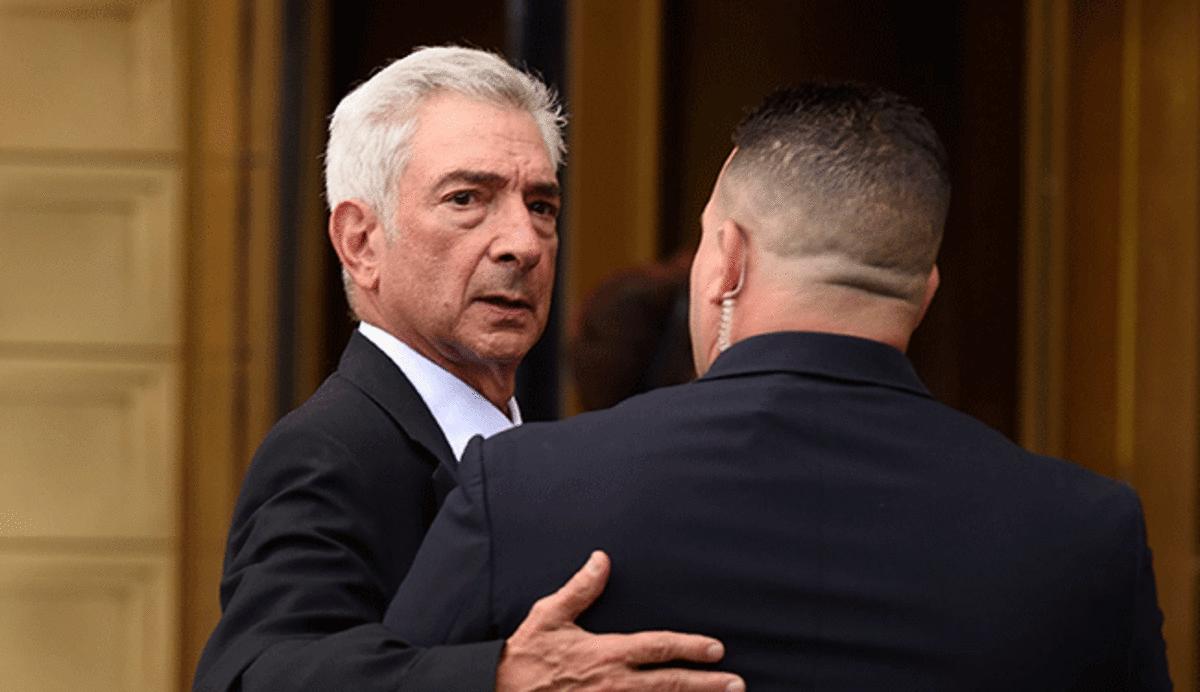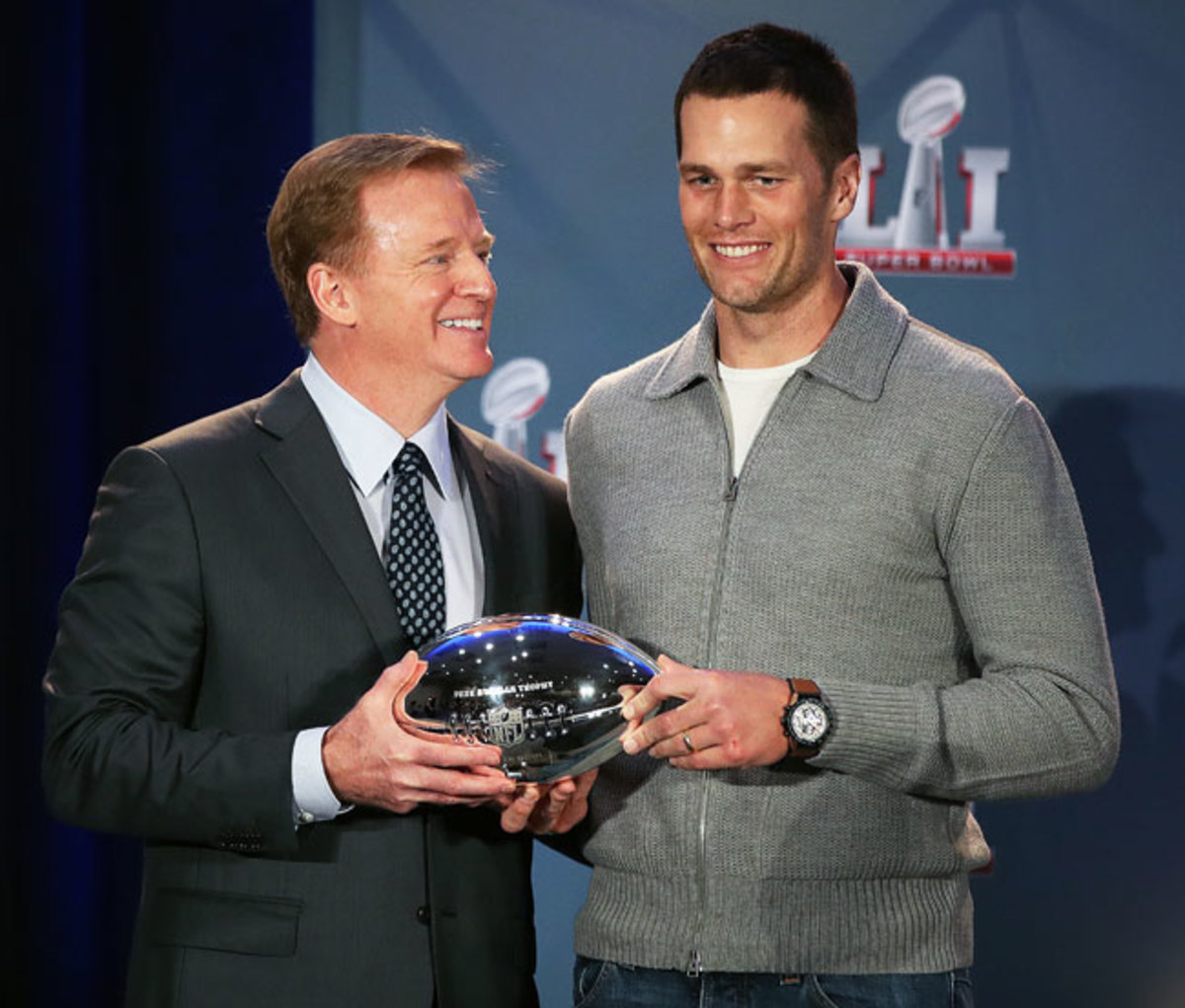Richard Berman: ‘Deflategate Is Finally Put to Rest’

NEW YORK — On a recent Tuesday night, Judge Richard Berman (yes, that Judge Berman) presided over a packed courtroom on the ninth floor of the Daniel Patrick Moynihan Courthouse in downtown Manhattan. Several hundred people filled the leather seats and wooden benches, listening closely to Berman’s introduction. Attorney Ted Wells (yes, that Ted Wells) sat at the front of the room. The last time these two men were in a courtroom together, Berman had temporarily vacated Tom Brady’s four-game suspension imposed by the NFL following Wells’ 243-page report on Deflategate. But on this night, the stakes were much lower.
Berman’s role this evening was not to judge, but to moderate a discussion—titled Arbitration in 2017—Where It is Heading—with a panel of high profile lawyers: Wells, well-known arbitrator Kenneth Feinberg, and commercial litigator Stephen Younger.
Feinberg also has a Deflategate tie. After the Second Circuit overturned Berman’s ruling, Feinberg submitted an amicus brief that argued why Brady’s case was relevant beyond professional football. Feinberg argued that Goodell’s decision was a biased abuse of authority and that Brady’s case should be reheard en banc (by the entire panel of judges). Feinberg wrote that if the ruling stood, it would, “fundamentally erode the public’s trust and opinion in arbitration.”
Goodell’s absolute power as an arbitrator has been widely criticized, which meant Deflategate entered the wide-ranging conversation when the topic switched to the partiality of the arbitrator. “That’s all about sports! That’s Tom Brady,” Feinberg shouted into the microphone while pointing at Berman and Wells. He went on to question Goodell’s partiality and the process of how he determined the punishment for Brady and the Patriots. “I wish the commissioner had been in the audience tonight, but his lawyer Ted Wells was,” Feinberg said with a laugh.
After the panel wrapped up, Berman spoke to The MMQB about Tom Brady’s Super Bowl win, whether justice was done, and what it’s like to be a footnote in NFL history.

KAHLER: Where did you watch the Super Bowl?
BERMAN: At home, with just my wife, Elizabeth. We thought about having a party but decided not to. We watched it at home and it was very depressing. Around 10 at night, New York time, I thought it was a lost cause, and I went downstairs to do something with the doorman and we were talking. I went back upstairs and Elizabeth says, ‘You know it is 28-20?’ And I thought, what? I don’t know what the score was before I left, but it was unbelievable, just unbelievable.
KAHLER: For Brady to win the Super Bowl after a four-game suspension is revenge in itself, but do you think that the unbelievable way in which he won makes that revenge even more powerful?
BERMAN: It was unbelievable. And if you noticed, there was some mention of Brady [during tonight’s panel], but not much. And I think the not much is because the Super Bowl settled the questions finally, right? I think Deflategate is finally put to rest by that Super Bowl.
KAHLER: So you’re saying that before this Super Bowl, there might have been more mentions of Brady with you around?
BERMAN: Maybe, yes, and with Ted Wells being there too. I always thought in the back of my mind when I had the case, that this is a case that should be settled on the field. Not in the courts, not with an arbitrator, and ultimately, that’s what happened. And in such a dramatic way that it left no doubt.
KAHLER: Were you happy that Brady won?
BERMAN: Yes, for a lot of reasons. Settling it on the field was really the most important to me.

KAHLER: So, justice was served on the field, but do you think justice was served in the courtroom for Tom Brady?
BERMAN: No. I would decide the way I decided in the same way today. I mean, I couldn’t actually, because the court of appeals has now had a precedent, but take that away, and I would go the same way. I would not change a thing.
I’m very comfortable with the proceedings at the courthouse and with my written opinion. I immediately made public the sealed (secret) proceedings from the NFL arbitration. Each side got a full opportunity to make their case publicly, both orally and in writing. I concluded that the NFL arbitration process was fundamentally flawed—principally because of lack of notice of the alleged infraction and of a potential four-game suspension; inappropriate comparison of football deflation to use of steroids; failure to allow Brady’s counsel to question NFL general counsel [Jeff] Pash; and refusal to share with counsel the notes of witness interviews. The commissioner’s arbitration award was not entitled to “deference” by the courts also because he had a personal stake in the outcome of the appeal. That is, he had an incurable conflict of interest, evident partiality, and could not possibly be fair … he was reviewing the discipline which he himself had imposed. Under these circumstances, the commissioner’s appeal decision must be held to a much higher level of scrutiny by the courts.
KAHLER: Have you talked to either Brady or Goodell since the case?
BERMAN: No.
KAHLER: This panel was all about arbitration and how it should be done. Do you think Goodell could have benefited from attending?
BERMAN: You know what, I think he does it the best way he can. I’m not sure he would have benefited from this conversation because this is not the way he does it. In preparing for today, of course I went over all the Brady issues and beyond. Even though it is provided in the collective bargaining agreement, in my opinion, it makes no sense that the person who made the decision would hear the appeal of that same decision. That person, try as they might, cannot be fair and cannot be objective. It’s just this inherent conflict of interest. You could argue, OK, they negotiated it and put it in there, and that is true, but as a judge looking at a situation like that, there is just no way that I am going to find that it is fair. So, I would do it the same way.
KAHLER: How does it feel to be a footnote in NFL history?
BERMAN: It’s fun. I have had other big cases. When I first started, I had this fabulous wine case. Not a criminal case, but a civil case, having to do with importation of wine from out of state, which was illegal in New York State. I ruled that that law was unconstitutional. I immediately got reversed 3-0 by the Second Circuit, but then it went to the Supreme Court and the Second Circuit got reversed 5-4. That case is in the same league as Deflategate. On the two occasions that I have had cases go to the Supremes after being reversed, they have been reversed. The wine case and Brady’s case are up there for me. If you think about it, they are in areas that people are interested in, sports and alcohol.
KAHLER: Do you think you will ever have another case as high profile as this one?
BERMAN: No. And I have had some big ones. I had a big so-called terrorist, a woman from Pakistan in a criminal case in 2010 [Aafia Siddiqui]. That was very, very high profile also, but the Brady case was in a league of its own.
KAHLER: Is it strange to be sort of a hero to Patriots fans? Do have any recent examples of being recognized by New England supporters?
BERMAN: My mother-in-law lives in Rhode Island, and I’m a hero in the coffee shop where she goes. It’s good for my mother-in-law, and it’s good for me for that reason.
KAHLER: Does she get a free cappuccino?
BERMAN: I don’t know what they do. But it’s been super fun. I said before, I’ve had high profile cases, but this one took on a life of its own. It’s hard to describe. I had another sports case, Carl Everett, he played for the Mets and was a great outfielder and he was charged with child abuse. [Everett’s children were placed in foster care temporarily during the case. Berman dropped the child abuse charges.] That day that case came, it was in family court in Queens, it was sort of like the Brady case. Queens Family Court has never seen anything like it, there were hundred of reporters and trucks, so that was kind of like a warm-up to the Brady case.

KAHLER: Our business of football columnist, Andrew Brandt, covered the trial. He noticed that from the start of the NFL-NFLPA hearings, you seemed more favorable in commenting and asking questions to the Brady/NFLPA side and much more strident in questioning the NFL side. Was that from reading the briefs or from any personal feelings?
BERMAN: It was all based on the briefs. I know some of the questions you are talking about, and I couldn’t quite get it. I remember I once said to the NFL side, “I’m having trouble finding the ‘Gate’ here.” So I guess that was an expression of my true feelings. I didn’t see what happened here that warranted a million dollars, two draft picks and a four-game suspension. It just didn’t add up. And, being a judge, we are very concerned with process. The thought of the decider ruling on his own decision, it was just beyond me. Plus, I couldn’t understand or didn’t really get why they couldn’t settle the case. So, if that’s the way I came across, that is interesting. I don’t remember it exactly, but I did have more questions of Goodell’s side than I did of the other side.
KAHLER: How does it feel to have a decision overturned? Is it hard to get over that?
BERMAN: It’s very disappointing. It helps that there was a dissent. [Chief Judge Robert Katzmann dissented in the Second Circuit’s split, 2-1, decision]. Katzmann is someone I know quite well. I know them all, all three of them quite well. I’m in sync with what Katzmann had to say, but it is too bad. I like to win.
KAHLER: Was it hard to let this decision go after it was over?
BERMAN: A little bit, yeah, it took awhile. It took awhile, so the Super Bowl was good for me too.
Question? Comment? Story idea? Let us know at talkback@themmqb.com
